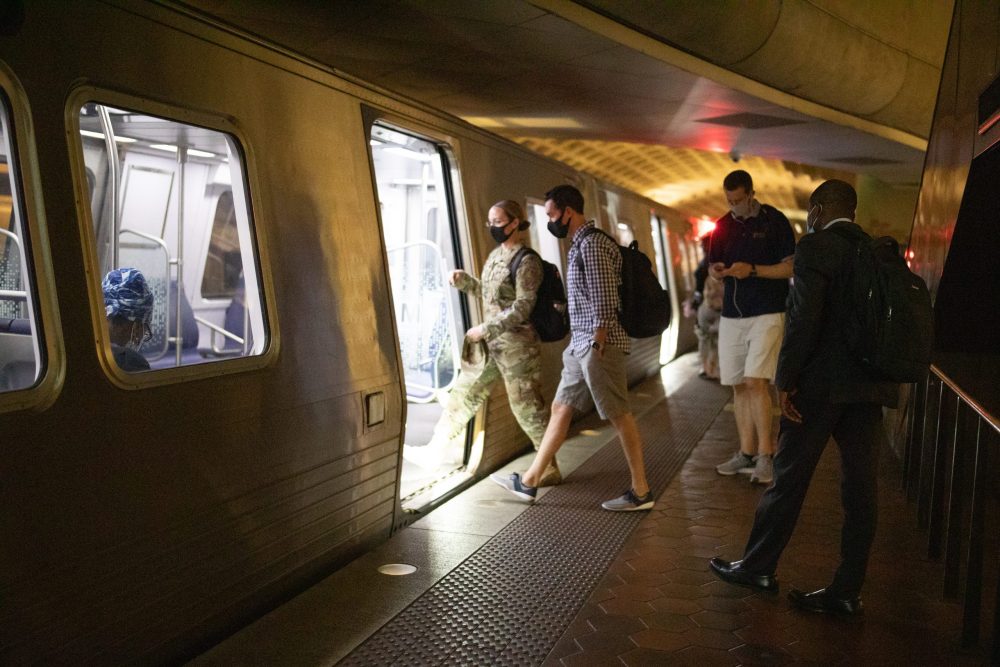WASHINGTON – Norah Riester was on her way home from a Washington Nationals game on a Friday evening when she encountered unmasked passengers in Metro rail cars.
The first car she boarded contained about four or five riders who were either not wearing masks or wearing them improperly, she said. The next car she boarded carried about 10 to 15 passengers. All but one of them was completely unmasked.
“… It shouldn’t be that hard to just wear a mask for like 15 minutes while you take the train or whatever it might be,” she said. “No one’s forcing you to take public transportation. But if you’re going to take public transportation, you should respect the people around you.”
The Transportation Security Administration on Aug. 20 extended the mask mandate for all public transportation networks, including on commercial planes and commuter bus and rail systems through Jan. 18. Despite this mandate, Metro patrons are encountering fellow riders who are ignoring the mandate, and health experts warn that behavior could jeopardize public health and safety.
The risk of contracting COVID-19 on public transit depends on a variety of variables, including local rates of infection and the ventilation in a vehicle, said Dr. Amesh Adalja, who is board-certified in infectious diseases and a senior scholar at the Johns Hopkins Center for Health Security.
The risk of infection on public transit increases when passengers don’t wear masks, Adalja said.
“The more of them there are, the more the risk goes on,” he said.
Not only are unmasked people placing themselves at risk of infection, but if infected, they’re risking the safety of others by spreading the virus, said Dr. Pia MacDonald, senior director of applied public health research at RTI International.
“So there’s a lot of factors that go into it, and it’s just important now while we’re still working on getting more and more people in our communities vaccinated that people adhere to the mask guidelines in terms of minimizing risk in these very public settings where a lot of different people are mixing,” she said.
Derek Van Tassel, a Northern Virginia resident who uses Metro to commute to and from work, said the Washington Metropolitan Area Transit Authority inconsistently enforces the mask mandate at best. He said he daily spots unmasked people, including passengers, Metro employees and Metro Transit Police officers.
Metro Transit Police don’t always intervene with violators, Van Tassel said. But when they do, he said it’s effective.
For instance, one time after he texted transit police about unmasked riders, officers stopped the train and handed masks to every noncompliant passenger, which the passengers kept on, Van Tassel said.
“In the event an MTPD officer sees an individual without a mask, they will provide one to the customer, no questions asked,” Metro told Capital News Service in an email. “In addition, we continue to emphasize compliance without conflict, and ask that employees not confront customers but utilize other options available to them such as providing a mask to them.”
Washington resident Adriana Radulescu said she witnessed a bus driver in the beginning of the pandemic refuse to let a commuter board a bus until she put on a mask. But recently an operator let a rider enter a bus without wearing a mask, she said.
“… I guess she didn’t want this woman to be right in her face,” Radulescu said, speculating about the latter driver. “I truly think (there’s) nothing they can do. These people are trained and their job is to transport people from A to B in a safe way, not to be policing people on the buses.”
Radulescu said she feels her whole body tense when she sees unmasked commuters. They’re mostly older people who sit next to the driver, she added.
For their protection, Metro said, bus operators have the option of stopping rides due to unsafe conditions and contacting transit police for assistance.
First-time offenders of the mask mandate may be penalized any amount between $500 and $1000, according to TSA. Second-time offenders may be penalized anywhere from $1000 to $3000.
Metro would not tell CNS if it issues fines to unmasked riders.
In a statement, Metro said it offers customers free masks and reminds them of the mandate with signage and other communications.
Some riders have taken it upon themselves to call on passengers to wear masks.
Metro rider Zack Ford of Washington said he asked a rail rider who took a mask off to sneeze to put it back on. Ford said he hasn’t seen very many people unmasked and hopes passengers remain dedicated to wearing them.
“… I want to protect myself and protect them, and I hope that they would do the same for me,” he said.
Van Tassel said he’s experienced riders arguing with him after he asked if they would wear their masks.
And Riester, recalling her travels home from the Nationals game on her first train, said it was up to the passengers to remind others to properly mask.
“… They complained, but they complied,” she said, noting one rider used vaccination status as an excuse for not wearing a mask.
Dr. David Marcozzi, chief clinical officer at the University of Maryland Medical Center, advises wearing masks indoors or in areas with a lot of people, regardless of being vaccinated, because the Delta variant is easily spread.
Robert Wald of Silver Spring said he informed a Metro employee about unmasked passengers at a rail station.
“I didn’t want to tell him how to do his job,” he said. “I just kind of waited for him to reply, there was no reply, and he kind of walked on … . But it just struck me as wrong.”
“I fully understand how difficult it is for the Metro employees to have to ask these people to constantly (put) masks on,” Riester said. “If the Metro really wants to keep people safe, … they need to be doing more than just, honestly, whatever it is they’re doing.”

